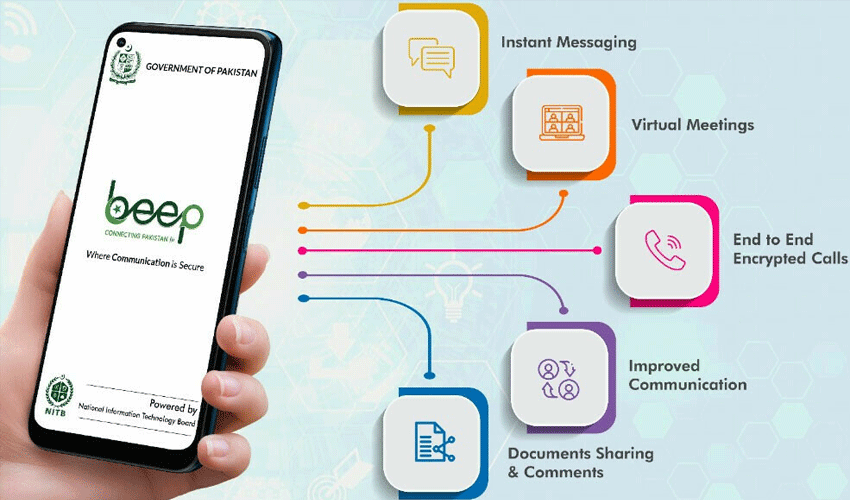The government’s ambitious project to ensure secure digital communication within state institutions continues to face setbacks as the Beep messaging application — launched in August 2024 — remains non-operational.
Despite the passage of over a year and a half and the spending of Rs572 million on its development, the application has not yet been activated across government departments due to pending security clearances from relevant intelligence agencies, according to multiple sources familiar with the matter.
The Beep application was announced as a landmark initiative to replace the use of foreign platforms like WhatsApp, Signal, and Telegram for official communications.
Developed by the National Information Technology Board (NITB) under the Ministry of Information Technology and Telecommunication, the app was meant to offer a secure and locally-hosted alternative to ensure the confidentiality of sensitive government conversations and document transfers.
Former federal IT minister Syed Aminul Haque inaugurated the app in August 2023, declaring that it would undergo a month-long trial before being rolled out for official use. However, the timeline has repeatedly shifted, with no definitive deployment date in sight.
Security concerns stall rollout
“The Beep application is undergoing extensive testing, but it cannot be formally launched unless it receives full security clearance,” a senior IT official said.
“All digital platforms intended for sensitive use must pass through a multi-tier vetting process, including scrutiny by security and intelligence agencies.”
Sources said that while internal trials and audits of the app’s performance and encryption protocols are ongoing, concerns have been raised over data encryption standards, potential vulnerabilities, and the app’s hosting architecture. These concerns must be resolved before the app can be considered safe for sensitive government use.
Due to these unresolved issues, the Ministry of IT has officially extended the deadline for the completion of the Smart Office Project — under which Beep falls — to June 30, 2025.
“The extension aims to provide more time for addressing security and performance issues,” another source added, noting that the government remains cautious about the reputational and operational risks that could arise from premature deployment.
Project accountability
The total development cost of Beep — Rs572 million — has come under scrutiny as the application continues to remain shelved. Experts in digital governance have questioned the transparency and efficiency of the project, suggesting that delayed government tech initiatives are often marred by bureaucratic bottlenecks and lack of oversight.
“This isn’t the first time that a government IT project has faced delays. The lack of a robust digital authority to oversee implementation and inter-agency coordination is a persistent issue,” said a cybersecurity analyst based in Islamabad.
They further noted that relying on imported communication tools, while a secure domestic solution remains in limbo, continues to pose a risk to national data sovereignty.
Strategic importance
The Beep app was envisioned not only as a secure communication tool but also as a step toward Pakistan’s long-term digital independence. Officials had hoped that its successful deployment could eventually allow its expansion to provincial departments and even state-owned enterprises, replacing foreign platforms for internal communications.
However, with continued delays, the project's broader potential is now in question.
“The intent behind Beep was sound. But such platforms need solid planning, regular consultation with security agencies, and technical flexibility — something we often ignore in public sector tech projects,” said a former NITB official, who worked on earlier digital transformation plans.


























